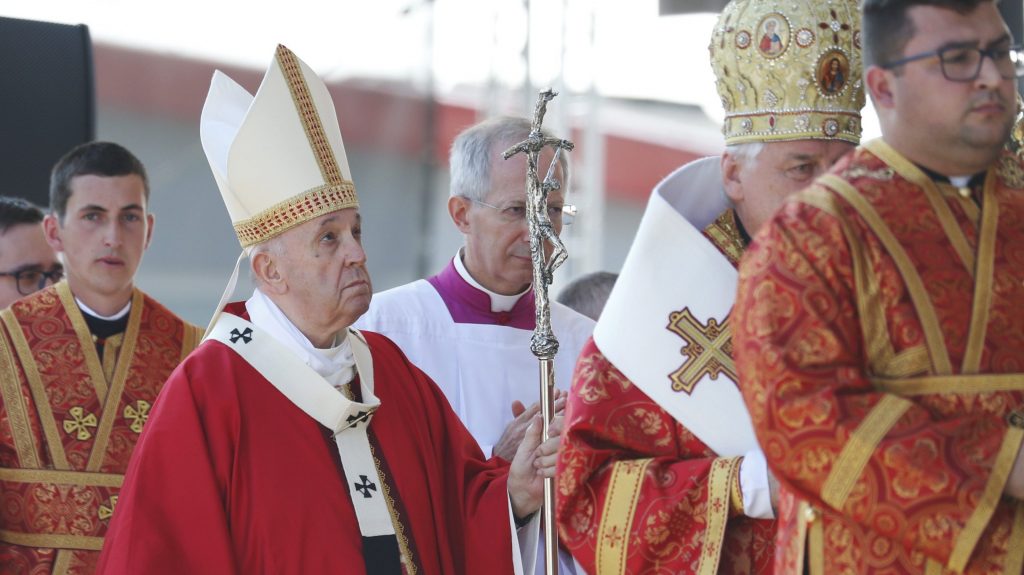Pope Francis on Tuesday said that the cross is not a flag to be waved nor a political symbol.
“Let us not reduce the cross to an object of devotion, much less to a political symbol, to a sign of religious and social status,” Francis said Sept. 14, when the Catholic Church marks the feast of the Exaltation of the Holy Cross.
The pope’s remarks were seen as a rebuke of populist politicians such as Matteo Salvini in Italy and Viktor Orban in Hungary using religious symbols as political tools.
The cross signifies Christ’s sacrifice, the pontiff said, and even though to the eyes of the world the cross represents failure or is seen as nothing more than one of the many bloody sacrifices that don’t change history. Yet, he said, the cross represents God’s saving of humanity.
“We can fail to accept, except perhaps in words, a weak and crucified God, and prefer instead to dream of a God who is powerful and triumphant,” Francis said. “This is a great temptation. How often do we long for a Christianity of winners, a triumphalist Christianity that is important and influential, that receives glory and honor? Yet a Christianity without a cross is a world Christianity and shows itself to be sterile.”
There have been many instances in recent years where politicians have used Christian symbols as political tools.
For instance, in June of 2020, Donald Trump posed with a bible at St John’s Episcopal Church during the Black Lives Matter protests.
Salvini has angered the Catholic Church in Italy for brandishing a rosary at political rallies and in parliament, despite his strong anti-Muslim and anti-immigrant rhetoric that openly clashes with the Church hierarchy.
Orban has justified his anti-immigrant rhetoric as an effort to protect a “besieged” Europe from outsiders, particularly Muslims.
Francis’s remarks came during a celebration of Divine Liturgy in the Byzantine Rite for 40,000 members of the Greek Catholic Church in Prešov, in eastern Slovakia.
He spoke about the centrality of the message of the cross in Christianity: “God saves us by allowing all the evil of our world to be unleashed upon himself.”
Crucifixes are found all over, the pope said, including as jewelry, in homes, cars and pockets.
But they have no real use, he added, “unless we stop to look at the crucified Jesus and open our hearts to him, unless we let ourselves be struck by the wounds he bears for our sake, unless our hearts swell with emotion and we weep before the God wounded for love of us.”
Francis said contemplating Jesus on the cross also leads to “bearing witness.”
“Here I think of the martyrs who in this nation bore witness to the love of Christ in troubled times, when everything counseled silence, taking cover, not professing the faith. Yet they could not help but testify,” he said, referring to the Christians who suffered under Nazi and then communist rule.
“How many generous persons suffered and died here in Slovakia for the name of Christ! Theirs was a witness borne out of love of him whom they had long contemplated. To the point that they resembled him even in their death.”
At present time, he said, there’s “no lack of opportunities” for bearing witness, even in countries such as Slovakia where, “thank God,” there’s no violent persecution of Christians as is the case in “too many other parts of the world.”
“Yet our witness can be weakened by worldliness and mediocrity,” he said.
“The cross demands instead a limpid testimony. For the cross is not a flag to wave, but the pure source of a new way of living. Which? That of the Gospel, that of the Beatitudes. A witness who bears the cross in his or her heart, and not only on his or her neck, views no one as an enemy, but everyone as a brother or sister for whom Jesus gave his life. A witness of the cross does not dwell on the wrongs of the past or keep lamenting the present,” Francis said.

